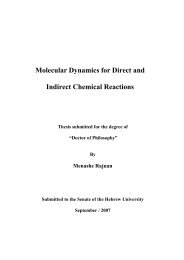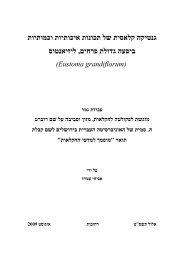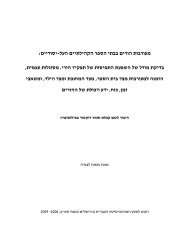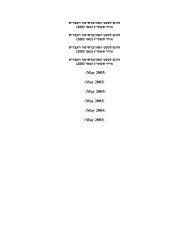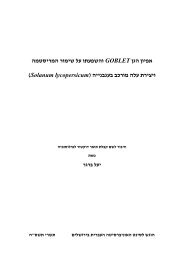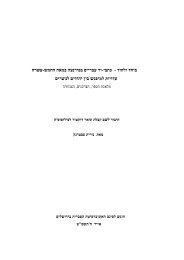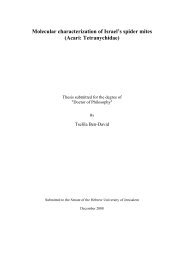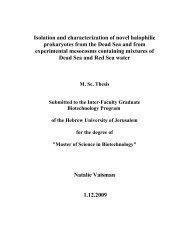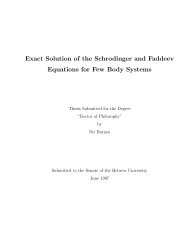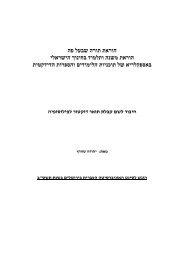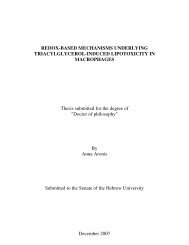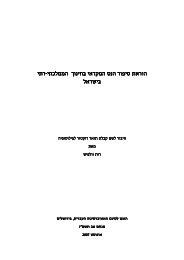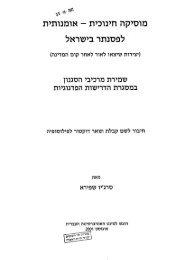Revealing the Mechanism of HSP104 Transcription Initiation in the ...
Revealing the Mechanism of HSP104 Transcription Initiation in the ...
Revealing the Mechanism of HSP104 Transcription Initiation in the ...
You also want an ePaper? Increase the reach of your titles
YUMPU automatically turns print PDFs into web optimized ePapers that Google loves.
104. Rosenheck, S., and M. Choder. 1998. Rpb4, a subunit <strong>of</strong> RNA polymerase II,<br />
enables <strong>the</strong> enzyme to transcribe at temperature extremes <strong>in</strong> vitro. J Bacteriol<br />
180:6187-92.<br />
105. Rossi, A., G. Elia, and M. G. Santoro. 1998. Activation <strong>of</strong> <strong>the</strong> heat shock<br />
factor 1 by ser<strong>in</strong>e protease <strong>in</strong>hibitors. An effect associated with nuclear factorkappaB<br />
<strong>in</strong>hibition. J Biol Chem 273:16446-52.<br />
106. Rowley, A., G. C. Johnston, B. Butler, M. Werner-Washburne, and R. A.<br />
S<strong>in</strong>ger. 1993. Heat shock-mediated cell cycle blockage and G1 cycl<strong>in</strong><br />
expression <strong>in</strong> <strong>the</strong> yeast Saccharomyces cerevisiae. Mol Cell Biol 13:1034-41.<br />
107. Ruis, H., and C. Schuller. 1995. Stress signal<strong>in</strong>g <strong>in</strong> yeast. Bioessays 17:959-<br />
65.<br />
108. Sanchez, Y., and S. L. L<strong>in</strong>dquist. 1990. <strong>HSP104</strong> required for <strong>in</strong>duced<br />
<strong>the</strong>rmotolerance. Science 248:1112-5.<br />
109. Santoro, N., N. Johansson, and D. J. Thiele. 1998. Heat shock element<br />
architecture is an important determ<strong>in</strong>ant <strong>in</strong> <strong>the</strong> temperature and transactivation<br />
doma<strong>in</strong> requirements for heat shock transcription factor. Mol Cell Biol<br />
18:6340-52.<br />
110. Schmitt, A. P., and K. McEntee. 1996. Msn2p, a z<strong>in</strong>c f<strong>in</strong>ger DNA-b<strong>in</strong>d<strong>in</strong>g<br />
prote<strong>in</strong>, is <strong>the</strong> transcriptional activator <strong>of</strong> <strong>the</strong> multistress response <strong>in</strong><br />
Saccharomyces cerevisiae. Proc Natl Acad Sci U S A 93:5777-82.<br />
111. Schwartz, D., and V. Rotter. 1998. p53-dependent cell cycle control: response<br />
to genotoxic stress. Sem<strong>in</strong> Cancer Biol 8:325-36.<br />
112. Shamovsky, I., M. Ivannikov, E. S. Kandel, D. Gershon, and E. Nudler. 2006.<br />
RNA-mediated response to heat shock <strong>in</strong> mammalian cells. Nature 440:556-<br />
60.<br />
113. Shen, W. C., S. R. Bhaumik, H. C. Causton, I. Simon, X. Zhu, E. G. Jenn<strong>in</strong>gs,<br />
T. H. Wang, R. A. Young, and M. R. Green. 2003. Systematic analysis <strong>of</strong><br />
essential yeast TAFs <strong>in</strong> genome-wide transcription and pre<strong>in</strong>itiation complex<br />
assembly. Embo J 22:3395-402.<br />
114. Sikorski, R. S., and P. Hieter. 1989. A system <strong>of</strong> shuttle vectors and yeast host<br />
stra<strong>in</strong>s designed for efficient manipulation <strong>of</strong> DNA <strong>in</strong> Saccharomyces<br />
cerevisiae. Genetics 122:19-27.<br />
115. Simon, J. R., J. M. Treger, and K. McEntee. 1999. Multiple <strong>in</strong>dependent<br />
regulatory pathways control UBI4 expression after heat shock <strong>in</strong><br />
Saccharomyces cerevisiae. Mol Microbiol 31:823-32.<br />
116. Smith, A., M. P. Ward, and S. Garrett. 1998. Yeast PKA represses<br />
Msn2p/Msn4p-dependent gene expression to regulate growth, stress response<br />
and glycogen accumulation. Embo J 17:3556-64.<br />
117. Sorger, P. K. 1991. Heat shock factor and <strong>the</strong> heat shock response. Cell<br />
65:363-6.<br />
118. Sorger, P. K., M. J. Lewis, and H. R. Pelham. 1987. Heat shock factor is<br />
regulated differently <strong>in</strong> yeast and HeLa cells. Nature 329:81-4.<br />
119. Sorger, P. K., and H. R. Pelham. 1988. Yeast heat shock factor is an essential<br />
DNA-b<strong>in</strong>d<strong>in</strong>g prote<strong>in</strong> that exhibits temperature-dependent phosphorylation.<br />
Cell 54:855-64.<br />
120. Stanhill, A., V. Lev<strong>in</strong>, A. Hendel, I. Shachar, D. Kazanov, N. Arber, N.<br />
Kam<strong>in</strong>ski, and D. Engelberg. 2006. Ha-ras(val12) <strong>in</strong>duces HSP70b<br />
transcription via <strong>the</strong> HSE/HSF1 system, but HSP70b expression is suppressed<br />
<strong>in</strong> Ha-ras(val12)-transformed cells. Oncogene 25:1485-95.<br />
59



